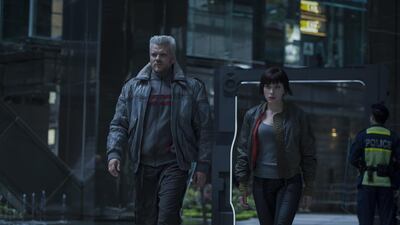Ghost in the Shell
Director: Rupert Sanders
Star: Scarlett Johansson, Michael Pitt, Takeshi Kitano, Pilou Asbæk
Four stars
Producing live-action remakes of animated classics has become the latest Hollywood fad, with Disney's billion-dollar Beauty and the Beast proving just how lucrative it can be.
Ghost in the Shell was a much riskier prospect than any Disney remake, however. Adapting adult-orientated Japanese anime – or rather, the manga (comics) that inspired it – was always going to be tricky. Adding to the challenge, legions of fans were displeased by the decision to cast Scarlett Johansson in the lead role , prompting high-profile allegations of yet more Hollywood "whitewashing".
Yet objectively the film, directed by Rupert Sanders, is breathtaking and at times brilliant.
Based on Masamune Shirow’s near-future manga series, the basis for Mamoru Oshii’s 1995 cult cyberpunk anime movie, this live-action wonder is an ambitious, visually stimulating ride that explores complex philosophical issues of identity and technology.
It also expands on the mythology of the source material, drawing from additional sources, including the 2004 anime sequel Ghost in the Shell 2: Innocence and the animated TV series.
It is set in the near future in New Port City, a teaming Asian-influenced metropolis of skyscrapers, advertising hoardings and flying vehicles (the upcoming Blade Runner 2049 sequel will have its work cut out to match this).
It is also a world in which humans have embraced cybernetics, grafting upgrades into their skin to enhance their bodies with the same enthusiasm hipsters visiting tattoo parlours do.
The real advancement comes with the idea of creating a synthetic body to house human consciousness. Enter the Major, played by Johansson, a prototype cyborg designed by leading tech company Hanka Robotics. When we first meet her, she’s working for the government counterterrorism unit Section 9, run by Chief Daisuke Aramaki (cult writer-director-actor Takeshi Kitano, who has the best non-tech enhancement of all – a wedge-crop of wild grey hair).
The plot kicks into gear when a terrorist with a grievance against Hanka begins to wage war against the company – but Ghost in the Shell is more inward-looking.
The Major has been experiencing internal glitches, despite reassurances from her creator, Dr Ouelet (Juliette Binoche). Inevitably, her encounter with the terrorist – a hooded figure called Kuze, played with real swagger by Michael Pitt – leads the Major to question her own existence.
Despite the outcry over her casting, Johansson is in many ways perfect for the role – one that feels like a companion piece to the female alien she played in Jonathan Glazer's unsettling Under the Skin.
Sanders also gets kudos for hiring Kitano, who only speaks his lines in Japanese.
But as much as they impress, it is hard not to be distracted by the sheer beauty of the film’s world-building. Every frame is bursting with life, as digital displays, posters and adverts flash before your eyes.
The fight scenes are more prosaic, feeling a little too overfamiliar – and the film loses momentum in the final third – with the so-called “spider tank” sequence in the finale something of a disappointment.
But this is still a hugely credible work. British-born Sanders, who previously made the mediocre revisionist fairy tale Snow White and the Huntsman, deserves applause for his devotion to the original. He is a true fan and it shows.
artslife@thenational.ae

